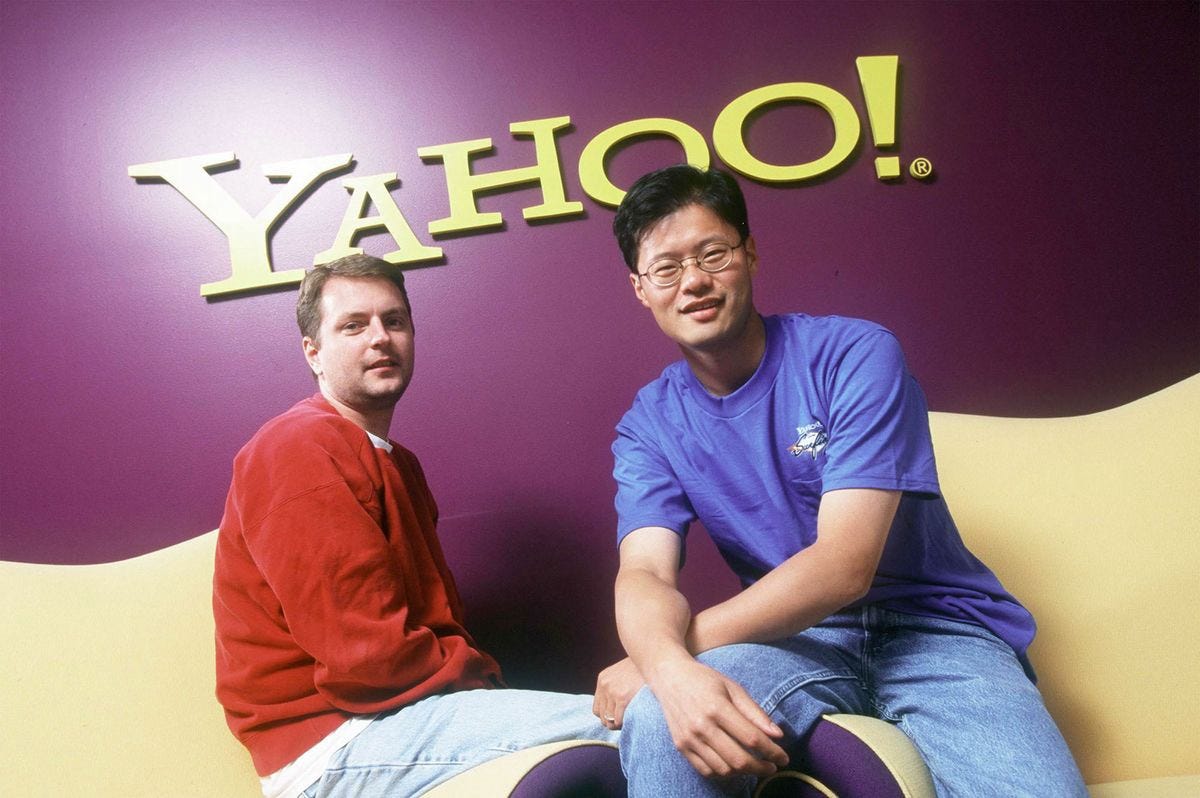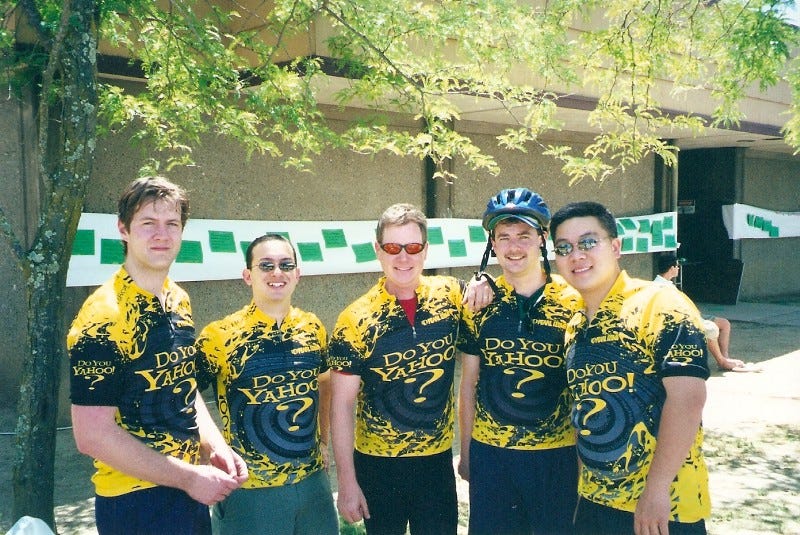Why Yahoo! Alumni are Mourning
Ex-Yahoos around the world are reminiscing fondly and lamenting the Verizon acquisition of their beloved company.
The news of Yahoo! being acquired by Verizon for $4.8B this week marks the end of an era. The end of an independent company started by two Stanford PhDs in a trailer to help the world navigate the world wide web before it became the Internet as we know it today. The end of what was once a hub of remarkable talent and innovation that reached millions around the world. Yahoo! never discovered the cure to cancer or invent virtual reality, but what it did was make the overwhelming tidal wave of the Internet accessible to the common man. It was what it set out to be, a portal that allowed grandma to read her daily news on My Yahoo! and check her e-mail from her grandkids on Yahoo! Mail. It let her chat with them on Yahoo! Messenger and see how her San Francisco Giants were doing on Yahoo! Sports. Yahoo! was a brand and a place that people from all walks of life trusted and relied on every day of their lives. This was all during a time when Google was a logo and a search box and Mark Zuckerberg was a 14-year old freshman in high school. Imagine working at a place where anything was possible because nothing had been done before on the Internet. The World Wide Web was literally the Wild Wild West and Yahoo! was it’s Lewis and Clark. When you work at a place that had assembled a group of insanely talented people to build great products with access to hundreds of millions of users around the world before anyone else, you create a very unique experience that comes along once in a lifetime. That is why we mourn.
The Unique Time
In 1998, I moved out to San Francisco from Philadelphia after college to work in consulting. After a year, I realized I hated it and decided to look for another job. I emailed my resume to Yahoo! for an associate producer position (a producer was a product manager before there were product managers) in the Yahoo! Finance team. I figured I could convince them that a kid one year out of Wharton undergrad who knew some HTML would surely be able to add value! It was clearly a shot in the dark but they hired me. As a 23 year-old, I was working with brilliant engineers and business minds to build products for the masses. I was basically being paid to go to grad school for product management.
During that time I launched one of the first premium services on Yahoo! where you could pay for access to real-time stock quotes across all of your Yahoo! sites and built a stock streamer in Java. I also got to work with H&R Block to launch a co-branded online tax filing service via Yahoo! Finance. I was a kid and I was working with senior management and executives at Fortune 500 companies because they wanted to work with Yahoo! and had no choice. Yahoo! was where the users were so if you wanted to play on the Internet back then, you had to play with us. We would have meeting after meeting with startups and big corporations who wanted to work with us and throw money at us. Millions of users visited Yahoo! Finance every single day including many of my friends from Wharton who were investment bankers on Wall Street and my dad who loved to day trade on the side. When you changed the font or moved something on a stock quote page, there would be a revolt because people were that familiar with the site. That was the level of influence and power Yahoo! had at the time and it was invigorating to be there.
The Unique People
People often talk about the PayPal Mafia or Xooglers going on to do great things. The original gangsters that came before all of them were the ex-Yahoo!s (xY!z). Yahoo! in the late 90s and early 2000s was like a playground for product people. It had the audience and resources to be bold and take risks. It could launch a new health vertical or gaming vertical and instantly have an audience of millions. The global reach drew talented individuals who wanted to build world-changing products. It was the place where they learned the importance of culture, leading by example, investing in people and standing by the end user.
One of the keys to success in the early days of Yahoo! was a culture of trusting small teams to operate independently. It was essentially an incubator of dozens of startups supported by the infrastructure and audience of a large company. The Yahoo! Sports team of a dozen took on ESPN and CBS Sports. The Yahoo! Mail team of twenty took on AOL Mail and Hotmail teams of hundreds. My very own Yahoo! Finance team of about fifteen people was the number one finance site in the world and took on a Microsoft Finance team of 300. We were lean before lean was even a thing. Each of our teams were Davids taking on Goliaths and we liked our odds. The leadership believed in us and empowered us with the entrepreneurial spirit that we could do anything. After our time at Yahoo! we leveraged that experience to boldly build and lead great company after great company.
You may have heard of some of these prominent Yahoo! Alumni (many of whom I am fortunate enough to call friends). Jeff Weiner, CEO of LinkedIn. Albert Lee, co-founder of MyFitnessPal (acquired by UnderArmour). Jennifer Dulski, President of Change.org. Dan Finnigan, CEO of Jobvite. Luanne Calvert, CMO of Virgin America. Andrew Braccia, general partner at Accel. Anthony Soohoo, founder and CEO of Dot & Bo. Dan Rosensweig, CEO of Chegg, Rob Solomon, CEO of GoFundMe. Jan Koum and Brian Acton, WhatsApp cofounders. Dave Goldberg, late SurveyMonkey CEO. Hill Ferguson, CEO of DoctorOnDemand. Vish Makhijani, CEO of Udacity. Brian Grey, ex-CEO of Bleacher Report (acquired by Turner). And the list goes on and on.
The Unique Culture
Bleed Purple. That’s what people who’ve worked at Yahoo! say after they’ve worked there. It’s visceral because that’s how passionate we were about the company. If you didn’t use the exclamation point after “Yahoo”, then you weren’t honoring the company and the culture. The bang, as the exclamation point was referred to, said it all. People were excited to be a part of the Yahoo! family. How many company names make people yodel? Jerry Yang and David Filo created a culture that wouldn’t allow anyone to take themselves too seriously as evidenced by their official titles as Chief Yahoos. There was an org chart and titles, but the culture was such that everyone was a peer regardless of hierarchy. They hired people without egos that cared more about the product and the users than their titles. When I visited the Yahoo! offices in Sydney and Taipei, we connected immediately because we shared the same purple blood.
I still remember being nervous when I went to David Filo’s cubical to ask him a question about our server performance. There he was, barefoot as always and ready to help. Jerry sat around the corner from my first cube and was warm and welcoming to any visitors. Every winter they would don Santa Claus hats and roam the halls with shopping carts personally handing out annual holiday gifts like a Yahoo!opoly board game or a Yahoo! sleeping bag. I don’t think you could find two more humble and gracious founders and that trickled down to the rest of the company. I will never forget the all-hands meeting in 2001 when Jerry tearfully prepared us for the company’s first ever round of layoffs and the departure of our CEO Tim Koogle. Jerry and David loved their employees as if we were their own children and it hurt them deeply when we were hurt. They weren’t seasoned corporate executives, they were two engineers who stumbled into a great idea and started a company.
The sense of family was ingrained in all of us who bled purple. I experienced this first-hand when in 2001, I lost my father suddenly and chose to move back to New York to care for my widowed mother. I loved my job but my time at Yahoo! would be cut short. My Yahoo! Finance family was so supportive during that difficult period in my life and I will never forget that. They covered for me when I was grieving and flying back and forth to the east coast to care for my mother. They were patient with me as I figured out my job situation. They cared for me as I was grieving. To this day, 15 years later, I still keep in touch with many of my colleagues from my team because we created bonds that are not easily broken. I started my first company with one of them and another teammate was an investor.
The Beginning of the End
I personally felt that after TK (as we affectionally referred to Koogle) left the helm, the company started to take a very different direction which may have marked the beginning of the end. By hiring Terry Semel from Warner Brothers to replace TK, the board decided to transform Yahoo! from a product company to a media company. They decided to tie the future of the company to chasing advertising dollars and building a giant sales organization. The culture started changing as Semel brought in a different breed of Yahoo! from Hollywood. Instead of focusing on building better products, we were distracted by slotting fees and media buys. Increasing pageviews and clickthroughs to hit quarterly earnings goals instead of championing the needs of our users.
At the time, Yahoo! dominated many categories like Yahoo! Sports and Fantasy Sports, Yahoo! Finance, Yahoo! News, Yahoo! Mail and so many more. There were many other missed opportunities with products like Answers (Quora), Flickr (Instagram, Google Photos), Geocities (SquareSpace, Medium), Auctions (eBay), Messenger (WeChat, Skype), 360 (Facebook), Real Estate (Trulia, Zillow) and so many more. Instead of plastering display ads all over Yahoo! Mail and charging people to turn them off, they could have focused on making the best e-mail experience and building more subtle and effective ad units the way Gmail did. Unfortunately, with an aging audience, it may have been an inevitable demise. No one will ever know what could have been. The board likely brought in Marissa Mayer, a product leader, to turn the tide, but it was too late. She went on a shopping spree which put the final nail in the coffin after her predecessors had failed to save the company.
To this day Yahoo! is still the best work experience of my career. I still reminisce with my old Yahoo! colleagues and friends about those times. Over on our Yahoo! Alumni Facebook Group (which sadly could have been a Yahoo! Group), over 5000 members are sharing old photos and waxing nostalgic this week after the Verizon deal was finally done. I just hope, like many of my fellow ex-Yahoo!s, to be able to emulate that special time and culture in my own company someday. If can do that, I will know that I succeeded in impacting the lives of my employees as much as Yahoo! had an impact on me even fifteen years later.








